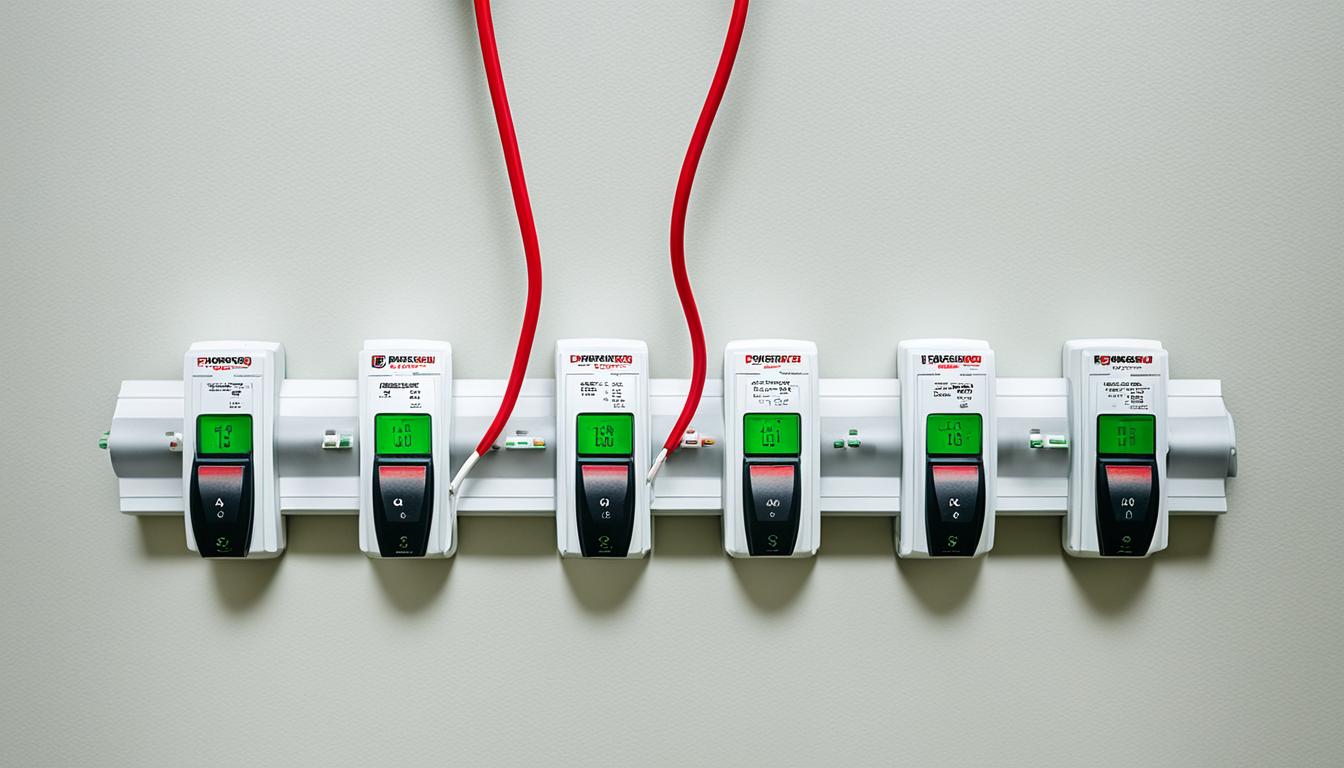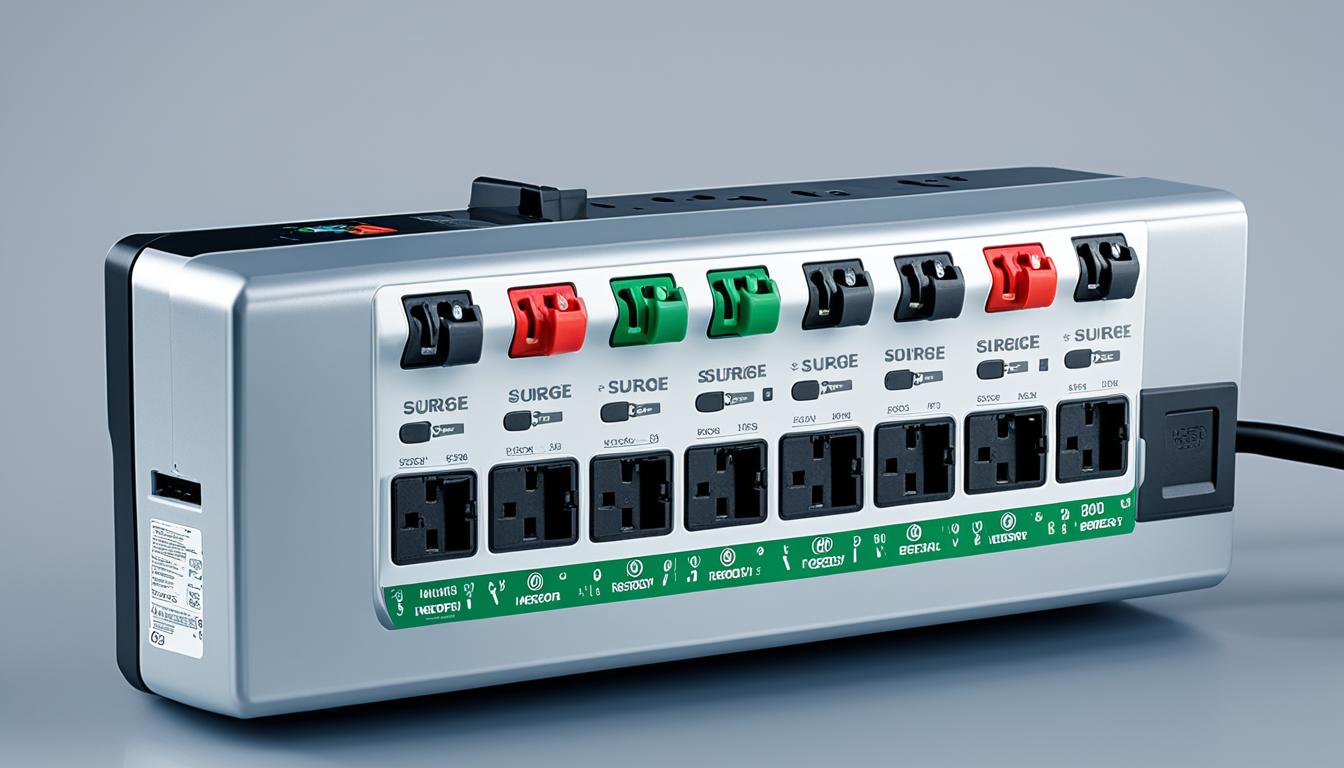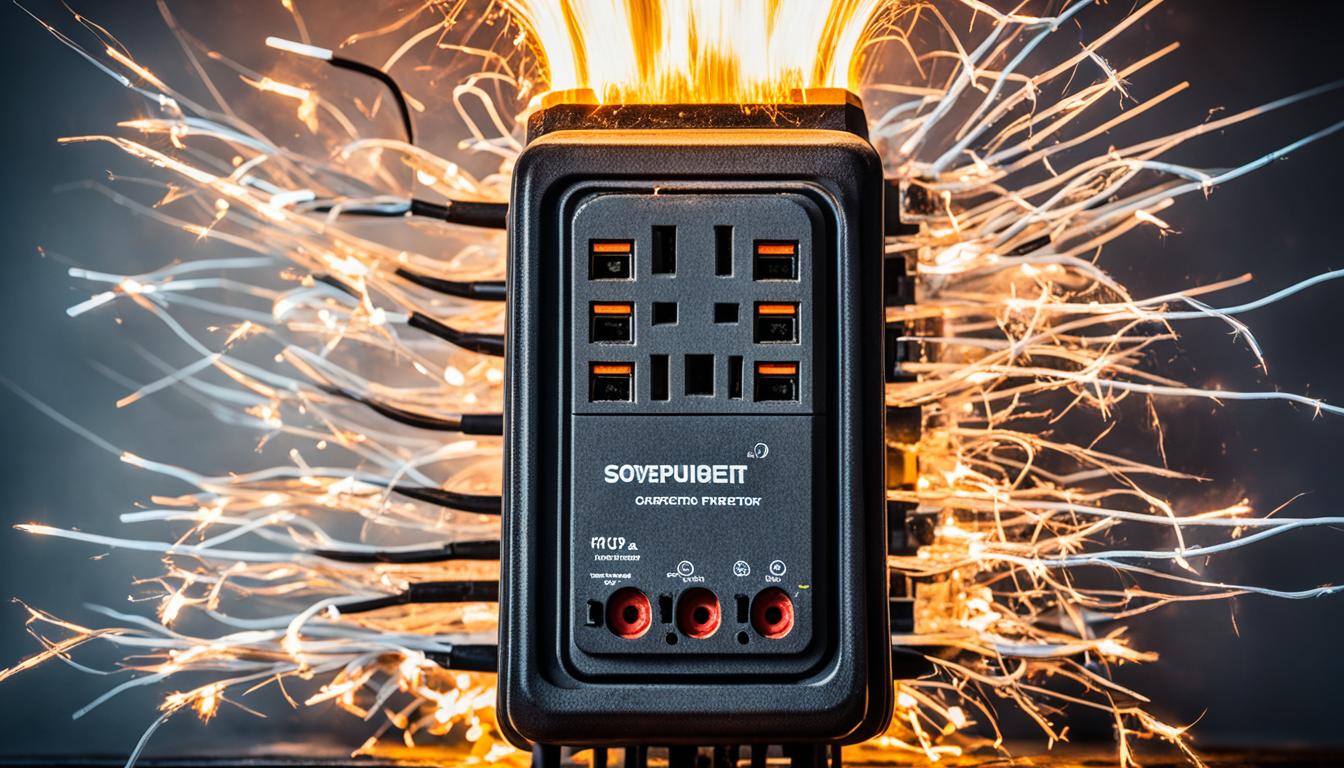When it comes to powering your devices and appliances, having a reliable extension cord is essential. Not all extension cords are the same, as they come in different sizes and gauges that determine their capacity to carry current and withstand heat. The length of the cord also affects voltage drop. Choosing the right extension cord for your needs is crucial for safety and optimal performance. Let’s explore the different types of extension cords and their recommended uses.
Key Takeaways:
- Extension cords come in different sizes and gauges to handle various power requirements.
- Understanding wire gauge is essential for selecting the right extension cord.
- Choosing the appropriate cord type based on your device’s power needs ensures safe and efficient performance.
- Indoor and outdoor extension cords serve different purposes and should be used accordingly.
- Consider additional safety features like GFCI protection and surge protectors for added electrical safety.
Understanding Extension Cord Gauges and Lengths
Extension cords are available in various wire gauges, which directly impact their current-carrying capacity and heat resistance. The wire gauge is denoted by a numerical value, and a lower gauge number indicates a thicker wire and a higher capacity to handle more electrical power. Choosing the right gauge for your extension cord is essential to ensure safe and efficient power delivery.
When it comes to extension cord length, it’s important to consider voltage drop. Voltage drop refers to the decrease in electric potential along the length of the cord. Generally, shorter cords experience less voltage drop and are more efficient for delivering power to your devices or appliances.
Note: Voltage drop can cause a decrease in the performance of your devices and appliances, particularly when they draw a higher amount of power.
To select the appropriate extension cord gauge and length, you need to determine the power requirements of your devices or appliances. Light-duty extension cords with 18 AWG (American Wire Gauge) wire are suitable for small electrical devices like lamps, chargers, and radios. For power tools and appliances drawing higher amperage, heavy-duty cords with 12 AWG wire provide the necessary capacity and are more resilient against heat generated by these devices.
It’s essential to match the wire gauge and cord length to your device or appliance’s power needs to avoid voltage drop and ensure safe operation.
Choosing the Right Extension Cord for Your Needs
When it comes to powering your devices and appliances, it’s crucial to choose the right extension cord that suits your specific needs. Extension cords come in various types and gauges, designed for different purposes and power requirements. Let’s explore the different categories available and understand which extension cord works best for you.
Light Duty Extension Cords
If you have small electrical devices like alarm clocks or LED light fixtures, light-duty extension cords are the ideal choice. These cords have thinner wires and are not designed for use with appliances that generate heat. They are lightweight and convenient, perfect for powering low-power devices. However, it’s important to exercise caution when using them and avoid overloading them with high-power appliances.
Medium Duty Extension Cords
For electronics that draw up to 10 amps, such as televisions and computers, medium-duty extension cords are the right option. These cords provide a higher current-carrying capacity and are suitable for a wide range of household and office electrical devices. With their thicker wires, medium-duty extension cords offer better heat resistance and efficient power delivery.
Heavy Duty Extension Cords
When it comes to powering power tools and appliances drawing 10 to 15 amps, heavy-duty extension cords are the way to go. These cords are built to handle higher amperage and have the thickest wires among all types of extension cords. With their robust construction, heavy-duty extension cords can withstand the demands of heavy-duty equipment and ensure safe and reliable power supply.
Remember to select the appropriate gauge based on the cord length to prevent voltage drop and maintain optimal performance. Whether you need a light-duty, medium-duty, or heavy-duty extension cord, choosing the right one will ensure safety and reliability for all your power needs.
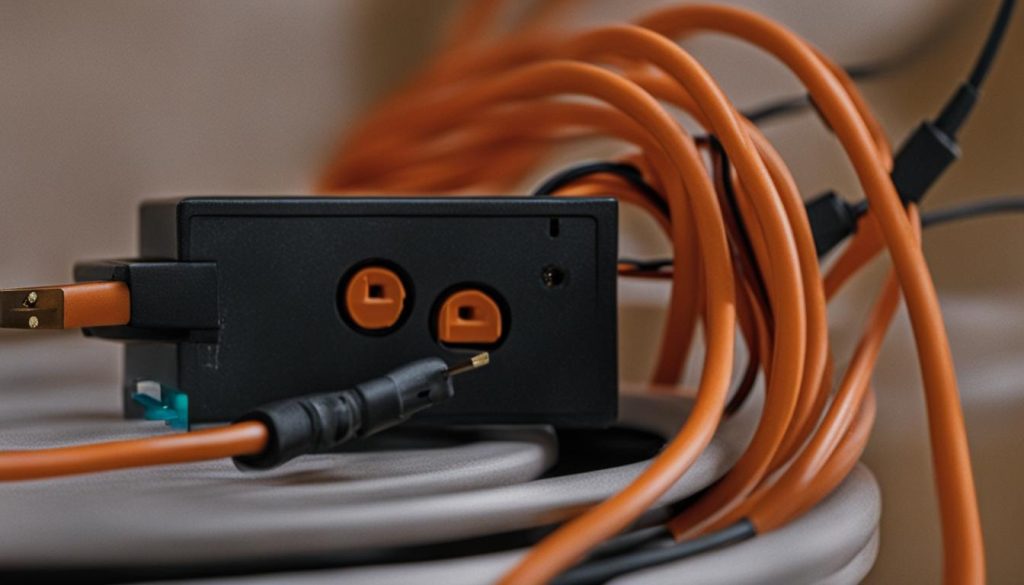
| Extension Cord Type | Recommended Uses |
|---|---|
| Light Duty | Small devices like alarm clocks and LED light fixtures |
| Medium Duty | Electronics drawing up to 10 amps (e.g., televisions, computers) |
| Heavy Duty | Power tools and appliances drawing 10 to 15 amps |
Indoor vs. Outdoor Extension Cords
When it comes to choosing the right extension cord for your power needs, it’s essential to understand the key differences between indoor and outdoor cords. These cords are designed with specific features to meet the demands of different environments and usage scenarios.
Indoor Extension Cords
Indoor extension cords are suitable for powering devices and appliances inside your home or office. They are typically thinner and shorter in length compared to outdoor cords. These cords are intended for occasional use and are not built to withstand harsh weather conditions.
Indoor extension cords are ideal for connecting small electronics, lamps, or other low-power devices. They provide a convenient solution for accessing power in hard-to-reach areas indoors without the need for additional electrical outlets.
Outdoor Extension Cords
Outdoor extension cords, on the other hand, are specially designed to withstand the rigors of outdoor environments. They are constructed with a durable layer of insulation and can come in longer lengths to accommodate various outdoor power needs.
Outdoor cords are further categorized based on their usage frequency and durability. Occasional use cords are suitable for smaller projects such as powering garden tools or holiday lights. They provide enough power for temporary outdoor activities but should not be used for prolonged periods.
Frequent use cords are designed for larger tools and equipment that require a more robust power source. These cords can handle higher amperage and provide reliable power for extended periods.
Rugged cords are the most durable and suitable for continuous use on job sites or other demanding outdoor applications. They are built to withstand rough conditions, including exposure to water, UV rays, and impact.
Choosing the Right Extension Cord
When selecting an extension cord, consider the location and nature of your power needs. Indoor extension cords are not designed to handle moisture or outdoor conditions and should never be used outside.
Using outdoor extension cords for outdoor applications ensures proper insulation and safety. These cords are designed to handle the elements and can withstand exposure to rain, snow, and sunlight.
It’s also essential to choose a cord that matches the power requirements of your devices or appliances. Consult the manufacturer’s guidelines for the appropriate cord gauge and amperage rating. Using a cord with an inadequate gauge or capacity can lead to overheating, voltage drop, and potential fire hazards.
| Extension Cord Type | Usage | Gauge | Length | Recommended Applications |
|---|---|---|---|---|
| Indoor Extension Cord | Occasional use indoors | 18 AWG | Short | Small electronics, lamps, low-power devices |
| Outdoor Extension Cord | Occasional use outdoors | 16 AWG or 14 AWG | Varies | Garden tools, holiday lights |
| Outdoor Extension Cord | Frequent use outdoors | 12 AWG | Varies | Power tools, equipment |
| Outdoor Extension Cord | Rugged, continuous use outdoors | 10 AWG or lower | Varies | Job sites, harsh environments |
Remember, using the right extension cord for the appropriate application is crucial for safety and optimal performance. Always read the manufacturer’s instructions and follow recommended guidelines to ensure safe and efficient power delivery.
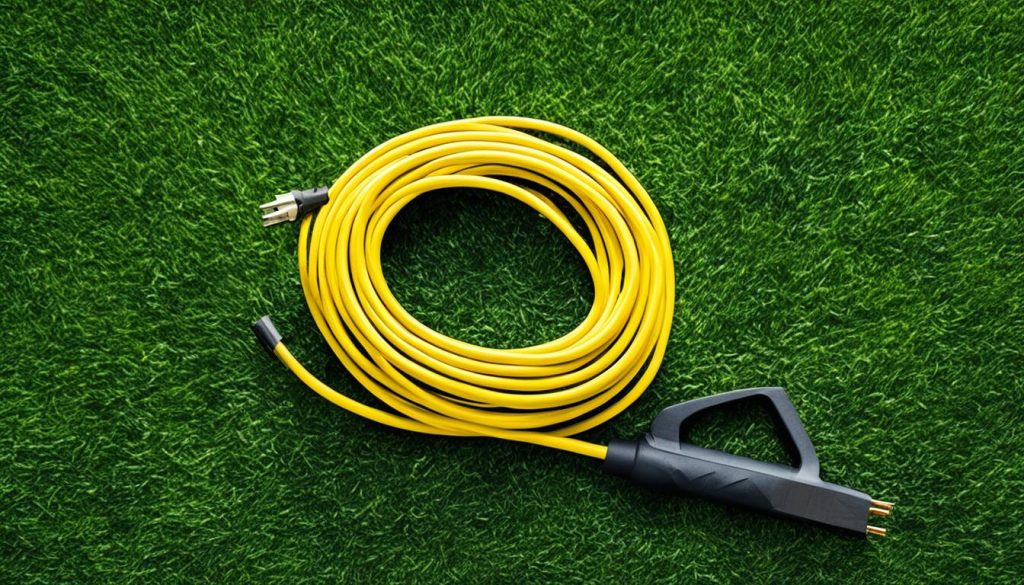
Special Features and Safety Tips for Extension Cord Usage
When it comes to using extension cords, it’s essential to prioritize safety. In addition to selecting the right type of cord for your needs, there are a few special features and safety tips to keep in mind:
GFCI Protection
Some extension cords come equipped with built-in Ground Fault Circuit Interrupter (GFCI) protection. This feature ensures electrical safety by shutting down power in case of a ground fault, protecting you from potential shocks or electrocution. When using extension cords in areas with water or damp conditions, such as outdoor spaces or bathrooms, consider using extension cords with GFCI protection.
Surge Protectors
If you need to power sensitive electronics like computers, TVs, or gaming consoles, it’s important to protect them from power surges and spikes. Surge protectors, often integrated into extension cords or available as standalone devices, safeguard your valuable equipment by absorbing and redirecting excess voltage. Using surge protectors alongside extension cords can provide an extra layer of protection for your electronic devices.
Extension Cords with Multiple Sockets
When you have multiple devices or appliances that need power, extension cords with multiple sockets can come in handy. Instead of using multiple cords or overcrowding a single outlet, these extension cords allow you to power multiple devices simultaneously. Be mindful of the total wattage and current draw requirements of the devices you are plugging in to avoid overloading the extension cord or the circuit it’s connected to.
General Extension Cord Safety Tips
- Always choose the appropriate power cord type for your specific needs, considering factors such as wire gauge and cord length.
- Avoid overloading extension cords by plugging in devices that exceed their capacity.
- Properly store extension cords when not in use to prevent damage or tripping hazards.
- Do not use wet extension cords or expose them to water or moisture.
- Check for safety certifications, such as UL or ETL listings, on the extension cord to ensure it meets industry standards for safety.
By following these safety tips and utilizing extension cords with special features like GFCI protection and surge protectors, you can ensure safe and efficient use of extension cords.
| Extension Cord Safety Tips | Special Features |
|---|---|
| Choose the appropriate power cord type for your specific needs. | GFCI protection |
| Avoid overloading extension cords. | Surge protectors |
| Properly store extension cords when not in use. | Multiple sockets |
| Do not use wet extension cords or expose them to water or moisture. | |
| Check for safety certifications on the extension cord. |
Remember, employing these safety features and following best practices will help ensure the safe and reliable use of extension cords in your home or workspace.
Conclusion
Extension cords are essential for providing power in situations where electrical outlets are not easily accessible. However, it is crucial to prioritize safety when using them. Always choose the appropriate extension cord type, whether it is light duty, medium duty, or heavy duty, based on your specific power needs. Consider factors such as wire gauge, cord length, and insulation to ensure optimal performance and prevent electrical hazards.
For added protection, use surge protectors when connecting sensitive electronics to extension cords. These devices safeguard against power surges and spikes, prolonging the life of your valuable electronics. It is also important to follow safety guidelines to minimize risks. Remember to only use extension cords as temporary solutions and unplug them when not in use.
By prioritizing extension cord safety, selecting the right power cord type, utilizing surge protectors, and following proper usage guidelines, you can ensure a safe and reliable temporary electric solution for your power needs. Keep these tips in mind to protect yourself, your devices, and your home from potential electrical hazards.
FAQ
What is a medium duty extension cord?
A medium duty extension cord is designed for electronics that draw up to 10 amps, such as televisions and computers. It is suitable for everyday household use.
How do I determine the appropriate wire gauge for my extension cord?
The wire gauge of an extension cord determines its current-carrying capacity. For light-duty applications, such as small electrical devices, an 18 AWG wire is sufficient. Heavy-duty applications, such as power tools and appliances, require a 12 AWG wire. Consult the manufacturer’s recommendations and wattage requirements of your devices to choose the right wire gauge.
Does the length of an extension cord affect its performance?
Yes, the length of an extension cord can impact its performance. Longer cords experience more voltage drop, leading to a decrease in power output. It is advisable to use shorter extension cords when possible to reduce voltage drop and ensure optimal performance.
Can I use an indoor extension cord outdoors?
Indoor extension cords are not designed to withstand outdoor conditions. They do not have the same level of insulation as outdoor extension cords, which can lead to safety hazards. It is important to use outdoor extension cords for outdoor applications to ensure safety and proper functionality.
What are the special features to look for in an extension cord?
Some extension cords come with built-in Ground Fault Circuit Interrupter (GFCI) protection, which shuts down power in case of a ground fault, ensuring electrical safety. Surge protectors are recommended for sensitive electronics to protect them from power surges and spikes. Extension cords with multiple outlets allow you to power multiple devices simultaneously. Make sure to choose extension cords with safety features that suit your specific needs.
What are the safety tips for using extension cords?
To use extension cords safely, always choose the right power cord type for your needs, avoid overloading cords with devices drawing more current than the cord can handle, store cords properly to prevent damage, avoid using wet cords or cords with damaged insulation, and check for safety listings from reputable testing agencies. Additionally, it is important to unplug extension cords when they are not in use and to use them as temporary solutions rather than permanent electrical installations.
